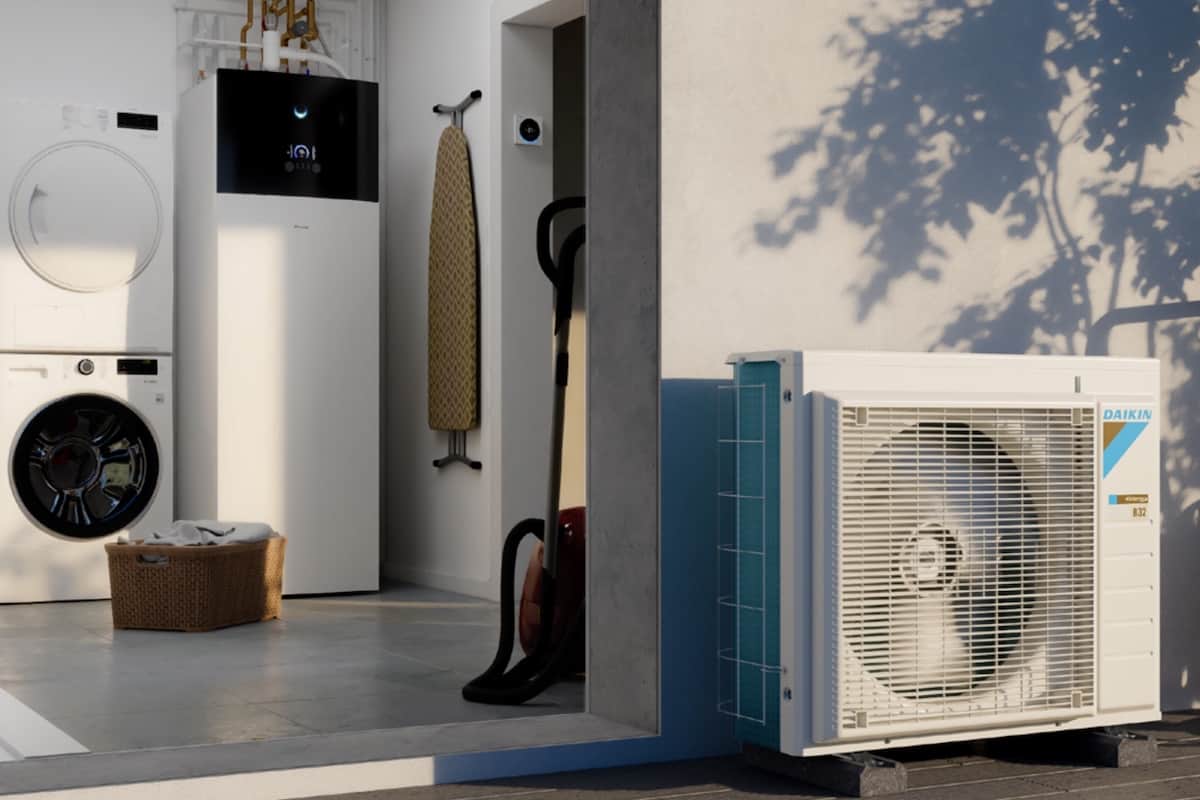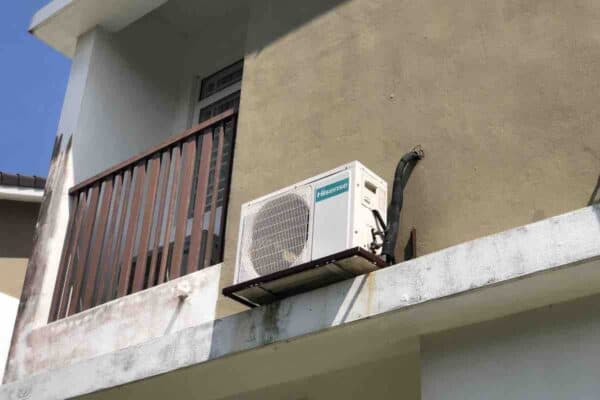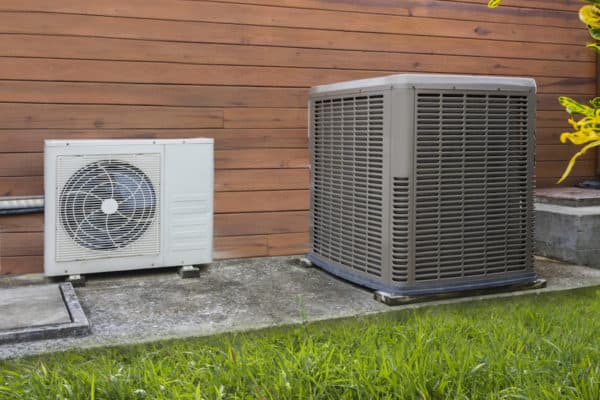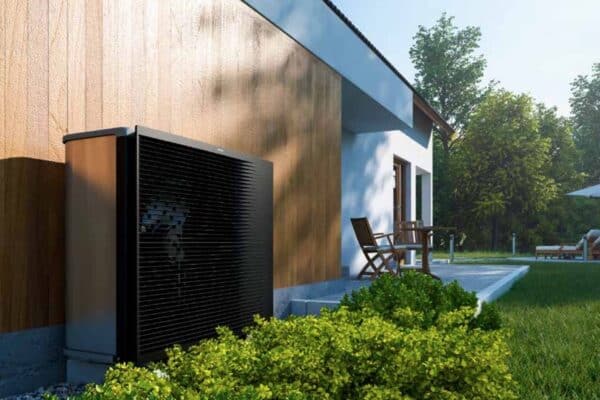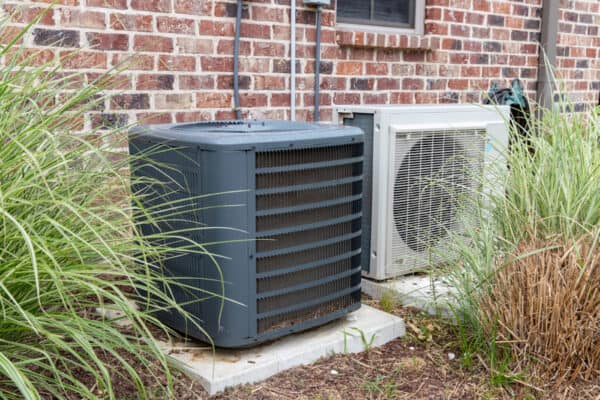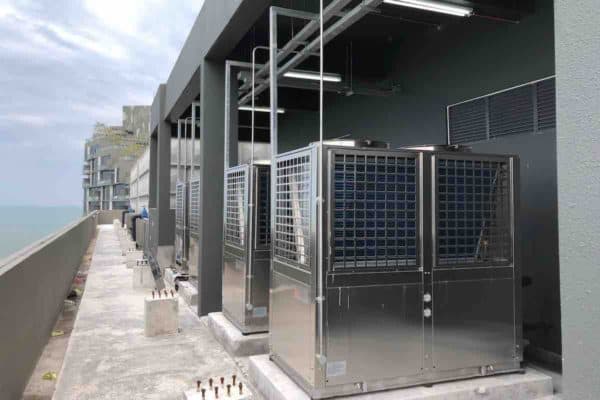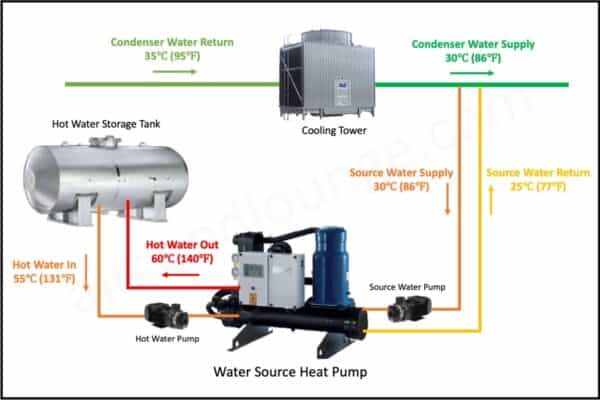How Daikin Altherma Heat Pumps Work?
Heat pumps are efficient heating systems. They are said to be the future of home heating systems as countries are starting to ban the use of gas boilers due to environmental concerns. I came across Daikin Altherma while doing research on home heating solutions and I find it very interesting.
Daikin Altherma is an air-to-water heat pump that can deliver heating, domestic hot water and cooling in one go. It integrates an air source heat pump with a stylish domestic hot water tank. Unfortunately, Daikin Altherma is currently available in the United Kingdom only.
Many countries could use a heating system like the Daikin Altherma or equivalent as their heating performance is approaching that of gas boilers.
What is Daikin Altherma?
Daikin Altherma was first introduced to the European market in 2006. As of 2022, it has evolved to Daikin Altherma 3, the 3rd generation of the Altherma series.
The latest version of the Daikin Altherma heat pump uses the R32 refrigerant, which is currently the most environmental-friendly refrigerant in residential applications.
Daikin Altherma is designed to cater to three different needs:
- Heating, domestic hot water and cooling
- Heating and domestic hot water
- Heating and cooling
For each need, there may be more than one type of Daikin Altherma heat pump for you to choose from depending on their product development.
At the heart of the Daikin Altherma is the Daikin air-to-water air source heat pump. It harvests heat from the ambient air and turns it into useful work through the refrigeration process.
Daikin Altherma even allows you to integrate a solar hot water system, maximizing renewable energy. For people who have limited space, Daikin Altherma offers compact wall-mounted units.
Most importantly, the Daikin Altherma HT high-temperature variant allows it to replace a gas boiler without needing to upgrade existing radiators.
How Daikin Altherma Works?
The flagship Daikin Altherma 3 R F is a floor-standing unit with an integrated domestic hot water tank. It is comprised of an indoor unit which is a domestic hot water tank and an outdoor unit, an air-to-water heat pump.
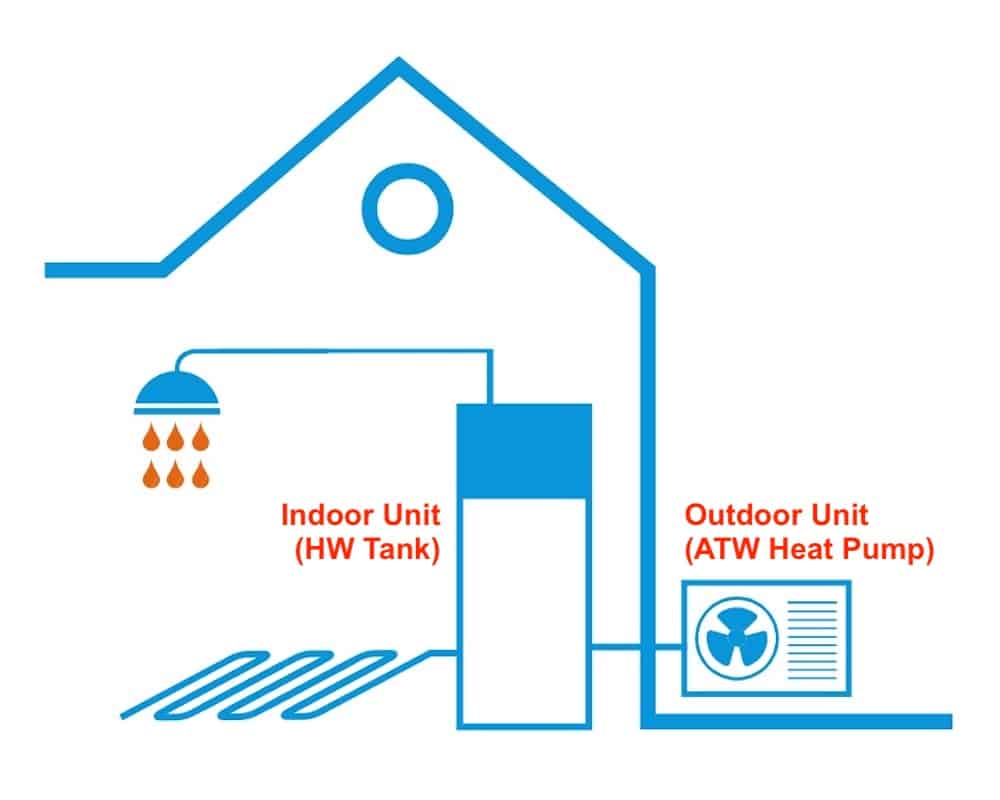
There are three separate loops in the Daikin Altherma as follow:
- Refrigerant Loop – Harvest and transfer heat from the ambient air to the indoor unit.
- Space Heating Loop – Obtain heat from the refrigerant and distribute it to radiators. Also, provide heating to the domestic hot water.
- Domestic Hot Water Loop – Replenish the domestic hot water tank and obtain heat from the space heating loop. Supplies to hot water taps when needed.
During operation, the Daikin Altherma air-to-water air source heat pump outdoor unit compressor compresses the R32 refrigerant into a high-temperature high-pressure gas. This hot refrigerant gas is then sent to the indoor unit via refrigerant pipes (see the blue color line in the below diagram).
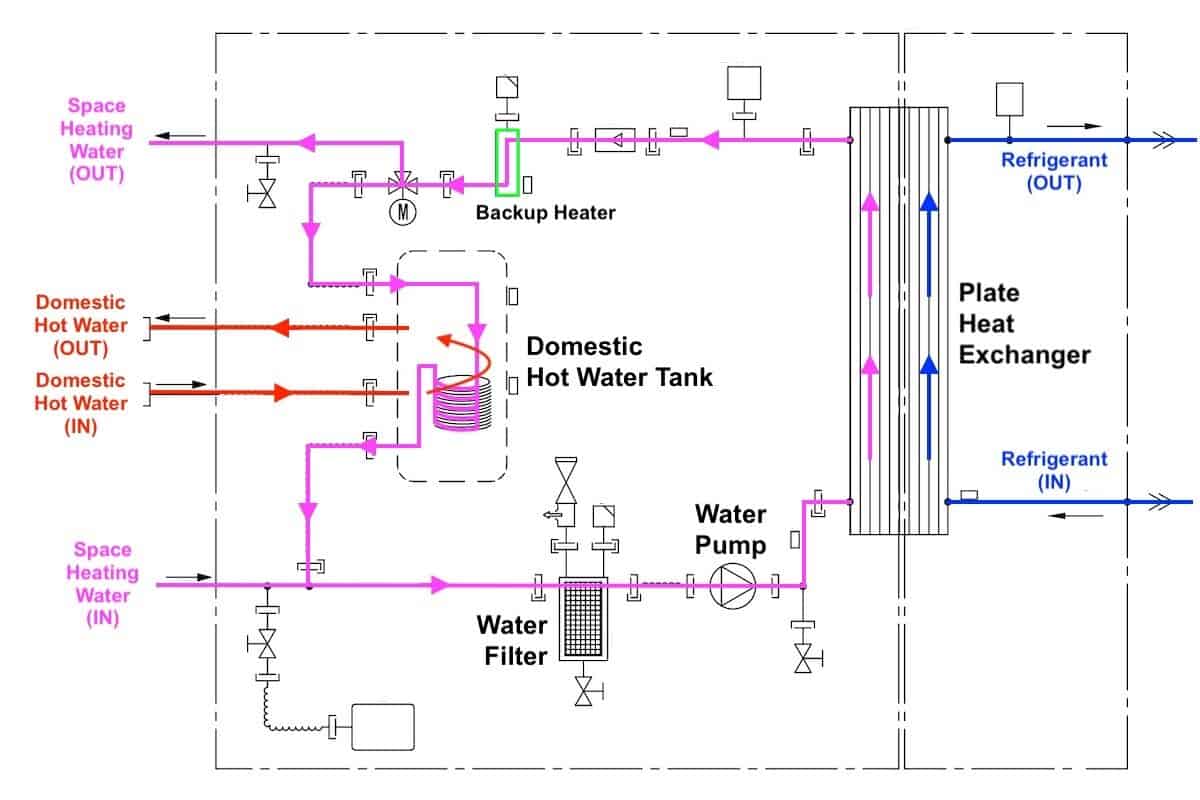
The Daikin Altherma indoor unit is an integrated domestic hot water tank. Inside, there is a plate heat exchanger where the hot refrigerant from the air-to-water heat pump releases heat to the space heating water.
Hot refrigerants enter the plate heat exchanger, release heat to the space heating water and return back to the outdoor unit where the heat harvesting process repeats again (blue color line).
Meanwhile, a pump built within the Daikin Altherma indoor unit circulates space heating water through the plate heat exchanger where the space heating water absorbs heat from the hot refrigerant (pink color line).
Inside the plate heat exchanger, the refrigerant does not contact the space heating water.
After the plate heat exchanger, the space heating water is distributed to various radiators throughout the house before returning back to the Daikin Altherma indoor unit.
At the same time, the space heating water also passes through a secondary heating coil that is located inside the Daikin Altherma domestic hot water tank.
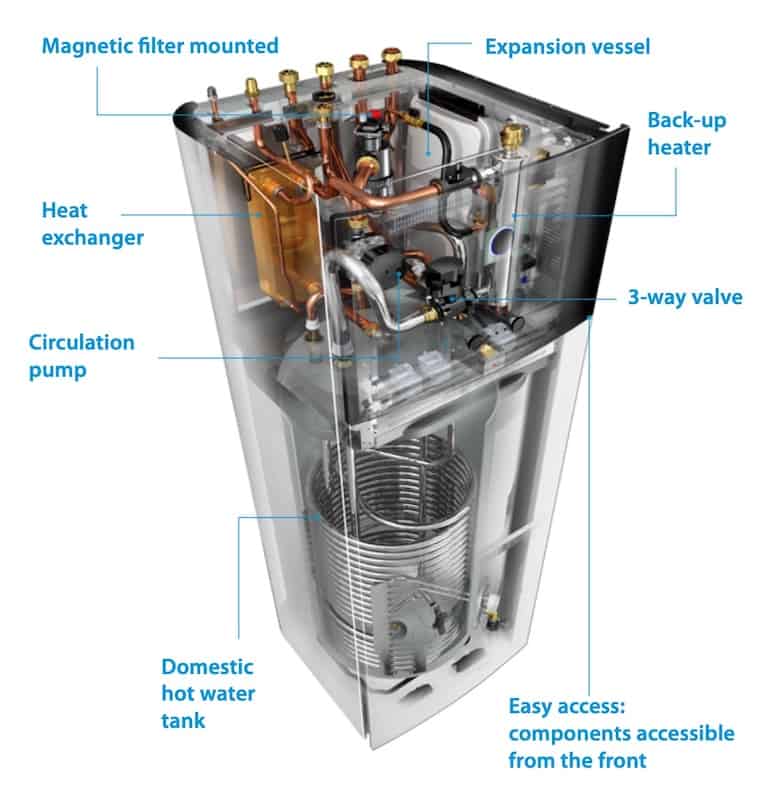
The Daikin Altherma domestic hot water tank is an insulated stainless steel tank with up to 230L of water storage volume. Domestic cold water fills the hot water storage tank and when the space heating water passes through the domestic hot water tank, the domestic cold water absorbs heat from the space heating water (red color line).
Whenever hot water is needed, the Daikin Altherma will release the stored domestic hot water.
In short, the Daikin Altherma harvests heat from the ambient air to heat the space heating water and then, the space heating water heats the domestic hot water.
Overnight, the temperature of the stored domestic hot water stored will drop. In this case, the Daikin Altherma heat pump will operate again to reheat the domestic hot water back to the set temperature.
The Daikin Altherma is capable of operating at a minimum ambient temperature of -25°C.
In the event that the Daikin Altherma struggles to harvest heat from the ambient air, the electric backup heater will kick in to provide supplemental heating to maintain the temperature of the space heating water and hence, the domestic hot water temperature.
Daikin Altherma Heating Performance
In my opinion, Daikin Altherma is a very good substitute for traditional gas boilers in terms of heating performance.
Traditional gas boilers normally circulate hot water to radiators at about 70°C. On the other hand, domestic hot water is usually stored at around 60°C.
The Daikin Altherma 3 R F is capable of maintaining space heating water at a maximum temperature of 65°C. Hence, storing domestic hot water at 60°C is not a problem at all.
Previously, air-to-water air source heat pumps have a bad reputation for being poor at space and water heating as they normally produce hot water at a temperature of around 40°C which is considered low for both space heating and domestic hot water.
As a result, people who use a low temperature (~40°C) air-to-water heat pump need to increase the size of their space heating radiators more than 2 times and use an electric heater to increase the domestic hot water temperature to 60°C once in a while to prevent Legionella growth.
Now, air-to-water heat pumps like the Daikin Altherma are able to provide hot water at a temperature approaching gas boilers.
Moreover, the Daikin Altherma R HT, which is a high-temperature variant is capable of delivering hot water at a staggering 80°C without an electric heater using a 2-step refrigerant heating process, eliminating the need to upgrade existing radiators.
Hence, it is never been so practical to replace a gas boiler with an air-to-water heat pump before with new air-to-water air source heat pumps like the Daikin Altherma.
Energy Efficiency of Daikin Altherma
Natural gas is still cheap in many places. In terms of energy cost, gas boilers are still very attractive. However, some people look beyond just the energy cost.
Heat pumps like the Daikin Altherma is using the R32 refrigerant which is a low global warming potential refrigerant. It produces hot water at energy efficiency of around COP 3.
In context, an electric heater has an energy efficiency of COP 1; one kW of power input produces one kW of heating power. Whereas heat pumps consume one kW of power but produce 3 kW of heating power.
Heat pumps achieve high energy efficiency by leveraging the refrigeration process as well as harvesting “free” and “renewable” energy from the ambient air.
Depending on the usage and energy cost, switching from a gas boiler to an air-to-water heat pump may be more appealing than expected.
Conclusion
I believe heat pumps like the Daikin Altherma is the future of home heating solution. Heat pump technology has advanced so much that the hot water temperature produced by air source heat pumps like the Daikin Altherma is almost on-par with gas boilers.
In the future, I hope that more homes that need heating can access products like the Daikin Altherma so that they can switch from carbon positive to potentially carbon negative with the aid of solar power thereby making the world better.
If you have anything to add (or ask) about this topic, leave a comment down below!


